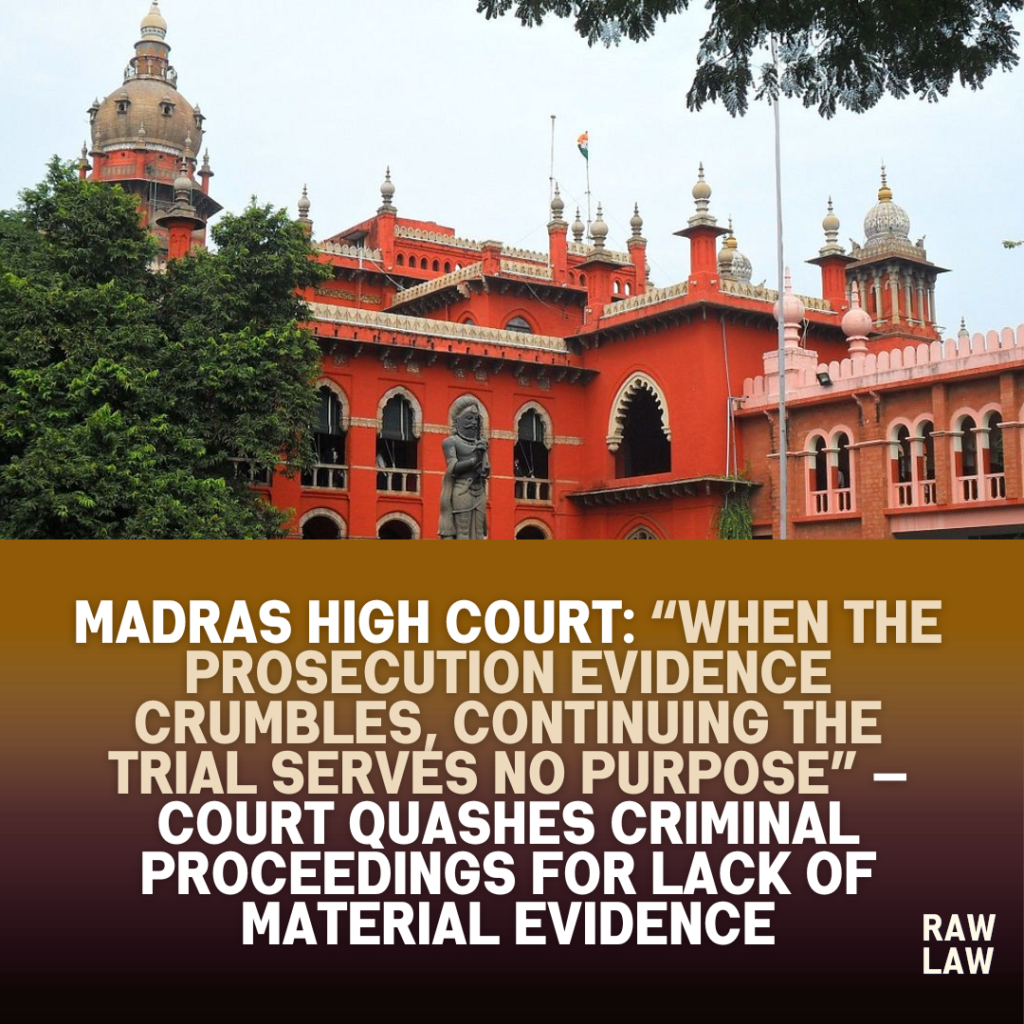Court’s Decision
The Madras High Court allowed the petition seeking quashing of criminal proceedings under Section 482 of the Code of Criminal Procedure, holding that the prosecution’s case was inherently weak due to absence of material evidence linking the petitioner to the alleged offences. The Court observed that compelling the petitioner to face a prolonged trial in such circumstances would amount to an abuse of process of law.
Facts
The petitioner was arrayed as an accused in a criminal case arising out of a complaint involving allegations of cheating and criminal conspiracy. The prosecution alleged that the petitioner, along with others, had played a role in inducing the complainant into a financial transaction through fraudulent representations. An FIR was registered, followed by filing of a charge sheet.
The petitioner approached the High Court contending that even if the entire prosecution case was taken at face value, no material connected him to the alleged offences. It was argued that the evidence relied upon was vague, unsupported by documents, and failed to satisfy the ingredients of the offences charged.
Issues
- Whether the allegations made in the charge sheet, even if accepted as true, disclosed the commission of the offences alleged against the petitioner.
- Whether continuation of criminal proceedings in absence of material evidence would constitute an abuse of process of court.
Petitioner’s Arguments
The petitioner contended that the prosecution had failed to establish any specific overt act or role attributable to him in the alleged offence. It was argued that:
- The charge sheet merely made general allegations without naming the petitioner in any transaction.
- There was no documentary evidence, witness statement, or recovery connecting him to the alleged acts.
- The allegations, even if accepted, did not satisfy the statutory ingredients of the offences under the Indian Penal Code.
- The Supreme Court’s settled principles in State of Haryana v. Bhajan Lal applied squarely, warranting quashing at the threshold.
Respondent’s Arguments
The prosecution opposed the petition stating that:
- The charge sheet contained sufficient materials to proceed to trial.
- The petitioner’s role could only be established during the course of evidence and should not be pre-empted at the quashing stage.
- The inherent powers under Section 482 CrPC must be exercised sparingly and only in cases of manifest injustice.
Analysis of the Law
The Court examined Section 482 CrPC, emphasising that inherent powers are to be used to prevent abuse of process and to secure the ends of justice. The Court reiterated the settled position that where allegations in the charge sheet, taken at face value, do not constitute an offence, proceedings can be quashed. It referred to the necessity of prima facie evidence linking an accused to the alleged crime before subjecting them to the ordeal of trial.
Precedent Analysis
- State of Haryana v. Bhajan Lal — Laid down categories where quashing is justified, including cases where allegations do not constitute an offence even if accepted in entirety.
- Amit Kapoor v. Ramesh Chander — Held that the High Court must look at whether uncontroverted allegations disclose an offence before allowing trial to proceed.
- Pepsi Foods Ltd. v. Special Judicial Magistrate — Observed that summoning of an accused is a serious matter and should not be done in a routine manner without sufficient material.
These precedents were applied to conclude that continuation of proceedings would be unwarranted in the absence of prima facie material.
Court’s Reasoning
The Court found that:
- The charge sheet failed to show any direct nexus between the petitioner and the alleged acts.
- The allegations were general in nature and lacked corroboration by documentary or oral evidence.
- No independent witness or transaction detail established the petitioner’s involvement.
- Proceeding with trial in such a case would be futile and oppressive, as there was no likelihood of conviction.
Quoting from Bhajan Lal, the Court emphasised that the law does not require an individual to undergo the rigours of trial when the foundational facts themselves are absent.
Conclusion
The High Court allowed the petition, quashing the criminal proceedings against the petitioner. It held that allowing the matter to proceed in the absence of material evidence would amount to harassment and an abuse of judicial process.
Implications
This decision reinforces the principle that criminal law should not be used as a tool for vexatious litigation and that courts have a duty to intervene at the earliest stage to prevent abuse. It underscores the importance of requiring tangible evidence before subjecting an individual to a criminal trial.
Cases Referred and Their Relevance
- State of Haryana v. Bhajan Lal — Provided the framework for quashing cases lacking prima facie material.
- Amit Kapoor v. Ramesh Chander — Guided the Court on when to exercise inherent powers in criminal matters.
- Pepsi Foods Ltd. v. Special Judicial Magistrate — Cautioned against summoning without adequate evidence.
FAQs
Q1: Can the High Court quash criminal proceedings if there is no direct evidence against the accused?
Yes, as per Bhajan Lal principles, if allegations do not constitute an offence even when accepted in full, the proceedings can be quashed.
Q2: Does the absence of documentary evidence automatically lead to quashing?
Not always, but if the absence makes it impossible to establish a prima facie case, quashing may be appropriate.
Q3: What is the purpose of Section 482 CrPC?
It empowers the High Court to prevent abuse of process and secure justice, including quashing proceedings where warranted.
